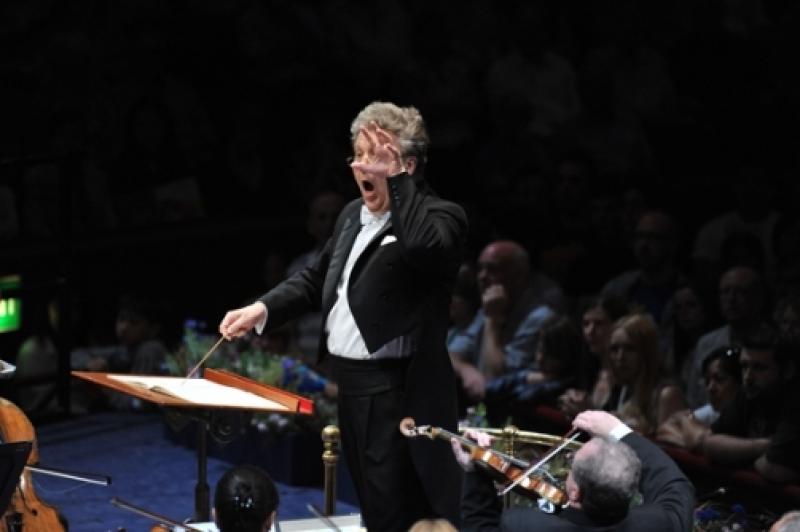BBC Proms: Lazić, Lloyd Webber, BBC Philharmonic, Sinaisky | reviews, news & interviews
BBC Proms: Lazić, Lloyd Webber, BBC Philharmonic, Sinaisky
BBC Proms: Lazić, Lloyd Webber, BBC Philharmonic, Sinaisky
Swapping violin for piano in Brahms fails, but a Russian conductor excels in Elgar

Several Prommers fainted, possibly out of boredom, in a longer than ever first movement of the Brahms Violin Concerto. The boredom, palpable around me, came not from pianist Dejan Lazić transcribing the fiddle part for his own pleasure - a communicative musician might have made us forget the original - but from the failure of Brahms's song to soar. Dyspeptic by half-time, I found everything awry: several obscure concert overtures would have worked better than Frank Bridge's Rebus, I'd have preferred many short cello-and-orchestra pieces to Holst's Invocation and thought any conductor might suit Elgar's Enigma Variations better than Vassily Sinaisky. Wrong, fortunately, on the last two counts.
Several Prommers fainted, possibly out of boredom, in a longer than ever first movement of the Brahms Violin Concerto. The boredom, palpable around me, came not from pianist Dejan Lazić transcribing the fiddle part for his own pleasure - a communicative musician might have made us forget the original - but from the failure of Brahms's song to soar. Dyspeptic by half-time, I found everything awry: several obscure concert overtures would have worked better than Frank Bridge's Rebus, I'd have preferred many short cello-and-orchestra pieces to Holst's Invocation and thought any conductor might suit Elgar's Enigma Variations better than Vassily Sinaisky. Wrong, fortunately, on the last two counts.
Share this article
Add comment
The future of Arts Journalism
You can stop theartsdesk.com closing!
We urgently need financing to survive. Our fundraising drive has thus far raised £49,000 but we need to reach £100,000 or we will be forced to close. Please contribute here: https://gofund.me/c3f6033d
And if you can forward this information to anyone who might assist, we’d be grateful.

Subscribe to theartsdesk.com
Thank you for continuing to read our work on theartsdesk.com. For unlimited access to every article in its entirety, including our archive of more than 15,000 pieces, we're asking for £5 per month or £40 per year. We feel it's a very good deal, and hope you do too.
To take a subscription now simply click here.
And if you're looking for that extra gift for a friend or family member, why not treat them to a theartsdesk.com gift subscription?
more Classical music
 Shibe, LSO, Adès, Barbican review - gaudy and glorious new music alongside serene Sibelius
Adès’s passion makes persuasive case for the music he loves, both new and old
Shibe, LSO, Adès, Barbican review - gaudy and glorious new music alongside serene Sibelius
Adès’s passion makes persuasive case for the music he loves, both new and old
 Anja Mittermüller, Richard Fu, Wigmore Hall review - a glorious hall debut
The Austrian mezzo shines - at the age of 22
Anja Mittermüller, Richard Fu, Wigmore Hall review - a glorious hall debut
The Austrian mezzo shines - at the age of 22
 First Person: clarinettist Oliver Pashley on the new horizons of The Hermes Experiment's latest album
Compositions by members of this unusual quartet feature for the first time
First Person: clarinettist Oliver Pashley on the new horizons of The Hermes Experiment's latest album
Compositions by members of this unusual quartet feature for the first time
 Gesualdo Passione, Les Arts Florissants, Amala Dior Company, Barbican review - inspired collaboration excavates the music's humanity
At times it was like watching an anarchic religious procession
Gesualdo Passione, Les Arts Florissants, Amala Dior Company, Barbican review - inspired collaboration excavates the music's humanity
At times it was like watching an anarchic religious procession
 Classical CDs: Camels, concrete and cabaret
An influential American composer's 90th birthday box, plus British piano concertos and a father-and-son duo
Classical CDs: Camels, concrete and cabaret
An influential American composer's 90th birthday box, plus British piano concertos and a father-and-son duo
 Cockerham, Manchester Camerata, Sheen, Martin Harris Centre, Manchester review - re-enacting the dawn of modernism
Two UK premieres added to three miniatures from a seminal event of January 1914
Cockerham, Manchester Camerata, Sheen, Martin Harris Centre, Manchester review - re-enacting the dawn of modernism
Two UK premieres added to three miniatures from a seminal event of January 1914
 Kempf, Brno Philharmonic, Davies, Bridgewater Hall, Manchester review - European tradition meets American jazz
Bouncing Czechs enjoy their Gershwin and Brubeck alongside Janáček and Dvořák
Kempf, Brno Philharmonic, Davies, Bridgewater Hall, Manchester review - European tradition meets American jazz
Bouncing Czechs enjoy their Gershwin and Brubeck alongside Janáček and Dvořák
 Solomon, OAE, Butt, QEH review - daft Biblical whitewashing with great choruses
Even a top soprano and mezzo can’t make this Handel paean wholly convincing
Solomon, OAE, Butt, QEH review - daft Biblical whitewashing with great choruses
Even a top soprano and mezzo can’t make this Handel paean wholly convincing
 Two-Piano Gala, Kings Place review - shining constellations
London Piano Festival curators and illustrious friends entertain and enlighten
Two-Piano Gala, Kings Place review - shining constellations
London Piano Festival curators and illustrious friends entertain and enlighten
 Echo Vocal Ensemble, Latto, Union Chapel review - eclectic choral programme garlanded with dance
Beautiful singing at the heart of an imaginative and stylistically varied concert
Echo Vocal Ensemble, Latto, Union Chapel review - eclectic choral programme garlanded with dance
Beautiful singing at the heart of an imaginative and stylistically varied concert
 Scott, Irish Baroque Orchestra, Whelan, RIAM, Dublin review - towards a Mozart masterpiece
Characteristic joy and enlightenment from this team, but a valveless horn brings problems
Scott, Irish Baroque Orchestra, Whelan, RIAM, Dublin review - towards a Mozart masterpiece
Characteristic joy and enlightenment from this team, but a valveless horn brings problems

Comments
...
...
...
...
...
...
...
...
...